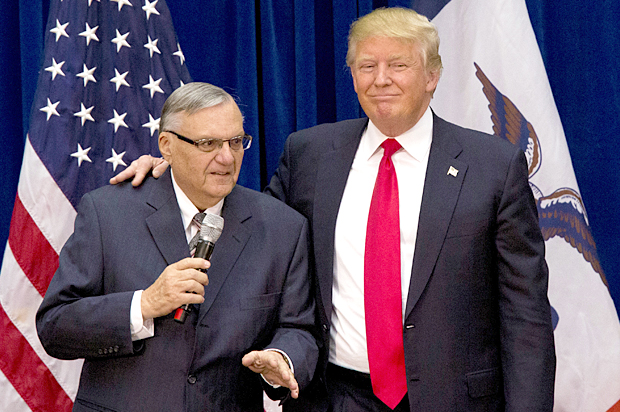Joe Arpaio, the former sheriff of Arizona’s Maricopa County who infamously forced inmates to live in sweltering, uninsulated outdoor tent cities and wear pink underwear to humiliate them, was pardoned Friday evening by President Donald Trump, multiple outlets reported.
The former sheriff had been found guilty of criminal contempt of court back in July 2017. The 85-year-old sheriff was sued for racial profiling and was ruled to have violated a court order “to temporarily cease making immigration-related arrests after he was sued for racial profiling,” as Matthew Sheffield reported for Salon in July.
Arpaio was widely seen as the face of far-right attitudes towards crime and criminality, and he was renowned for using the Maricopa County sheriff’s office as a tool for targeting and illegally detaining undocumented immigrants. As Ryan Gabrielson wrote in ProPublica:
[Arpaio]’s office had spent the previous year carrying out a constitutionally dubious dragnet search for undocumented immigrants. Patrol deputies became expert at inventing pretexts for stopping the “load cars” that ferried immigrants through the county to points across the nation. Sheriffs descended on neighborhoods where day laborers waited for people willing to pay for their work. Voters repeatedly re-elected Arpaio as he carried out his pledge to transform the sheriff’s office into “a full-fledged anti-illegal immigration agency.”
In the past few years, Arpaio had become obsessed with the “birther” conspiracy. In 2016, Arpaio claimed that his investigation of Barack Obama’s birth certificate definitively proved that it was a “fradulently created document.” Many critics, including Chauncey DeVega of Salon, have argued that birtherism is “conspiracy theory fare mated with white supremacist invective.” “For birthers, Obama is a black usurper and ‘affirmative action’ candidate whose life accomplishments are unearned and unwarranted,” DeVega writes. “To that end, in the birther imagination Obama was not qualified to attend Columbia University and is a fraud who somehow conned or was given unearned special dispensation and privileges.”
Arpaio and Trump both adhered to the birther conspiracy, which made them allies early on in Trump’s political career (though Trump later, begrudgingly, admitted he believed Obama was born in the U.S.). Likewise, their shared anti-immigrant rhetoric may have bonded them. During Trump’s rally in Phoenix earlier this week, the president hinted that he was going to pardon Arpaio. “I won’t do it tonight because I don’t want controversy,” Trump said.
Many pundits believed that a pardon of Arpaio was either ill-advised, legally questionable or politically impossible, or perhaps all three. Writing in the New York Times opinion pages, Martin H. Redish argued that because Arpaio was “convicted of violating constitutional rights,” pardoning him would “signal that governmental agents who violate judicial injunctions are likely to be pardoned, even though their behavior violated constitutional rights, when their illegal actions are consistent with presidential policies.” Redish continued:
[I]f the president signals to government agents that there exists the likelihood of a pardon when they violate a judicial injunction that blocks his policies, he can all too easily circumvent the only effective means of enforcing constitutional restrictions on his behavior. Indeed, the president could even secretly promise a pardon to agents if they undertake illegal activity he desires. […]
While the Constitution [r]ecognizes the very practical need for an executive, that doesn’t mean its framers feared the growth of tyranny any less. The Fifth Amendment’s guarantee of neutral judicial process before deprivation of liberty cannot function with a weaponized pardon power that enables President Trump, or any president, to circumvent judicial protections of constitutional rights.


